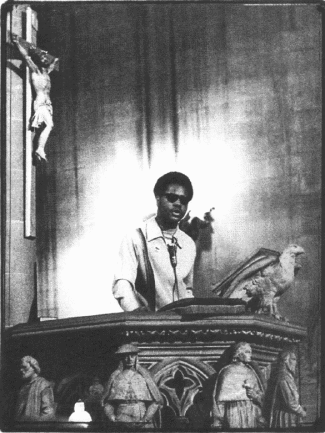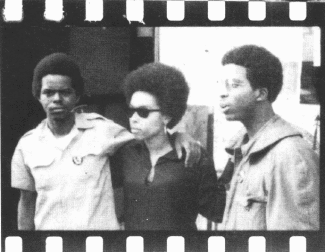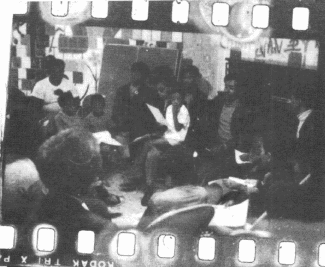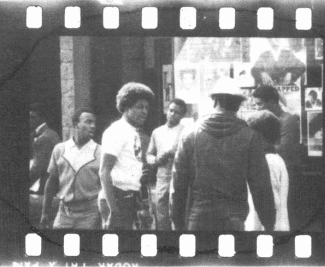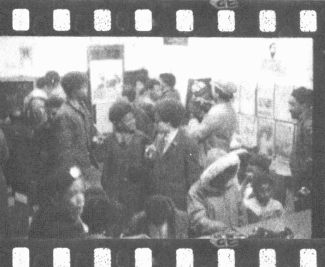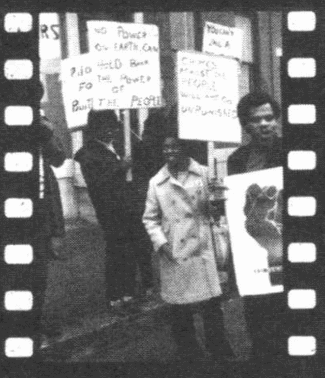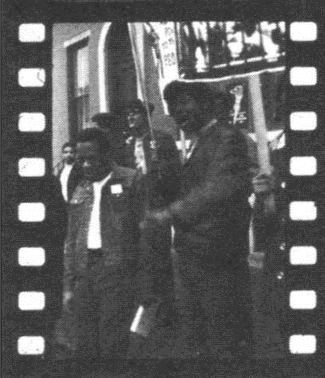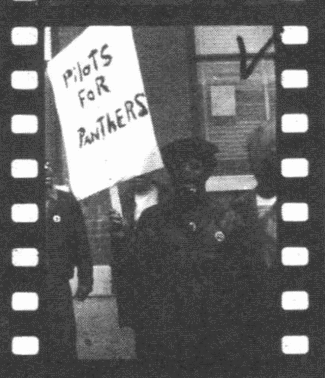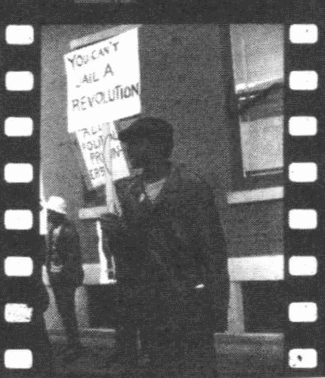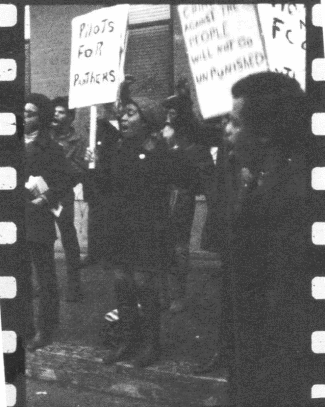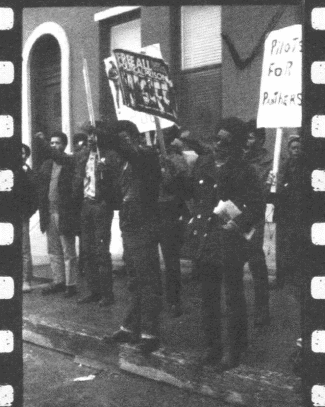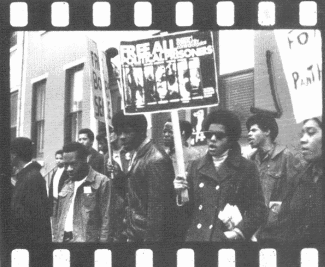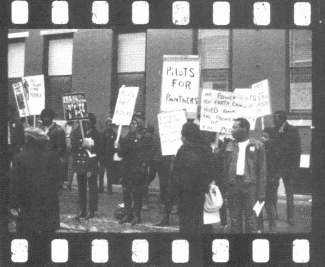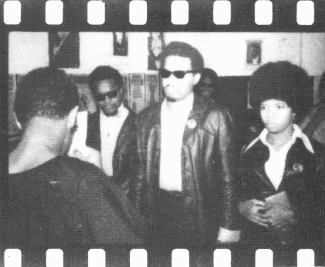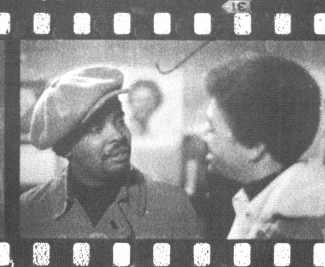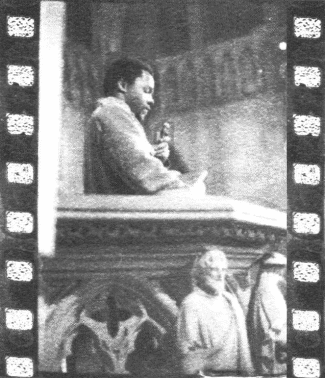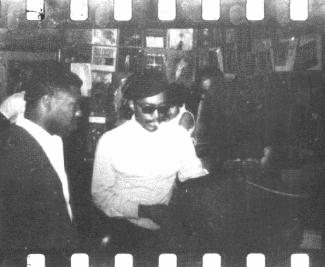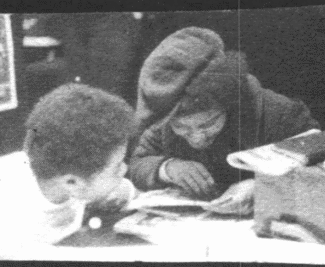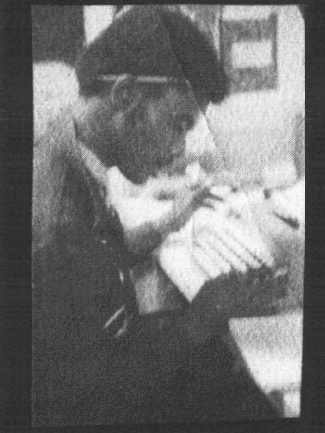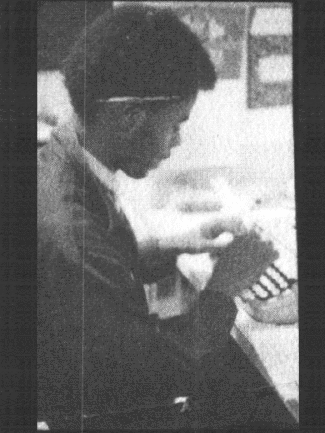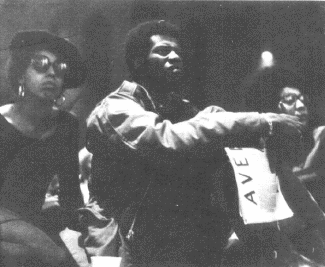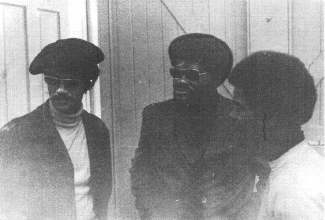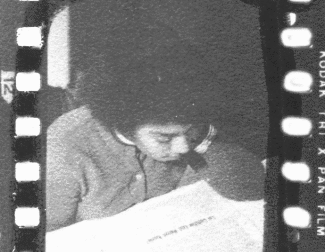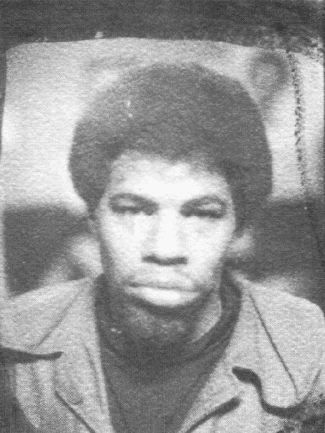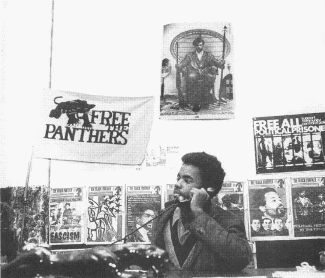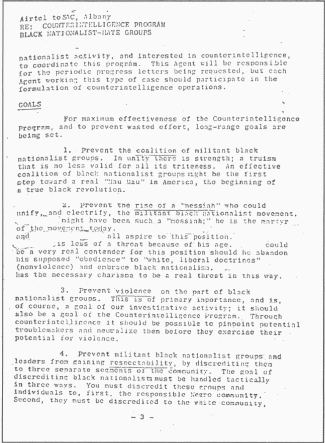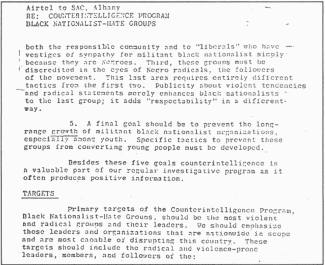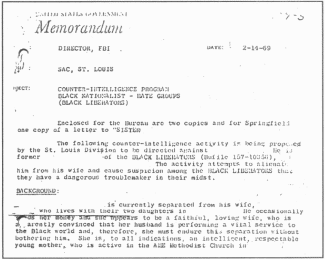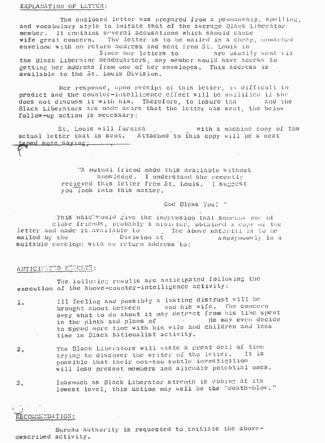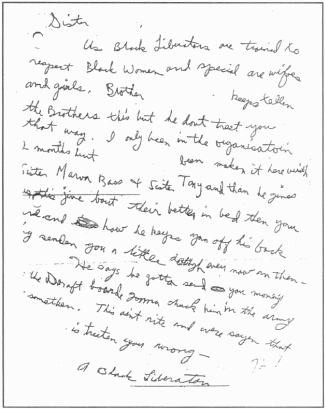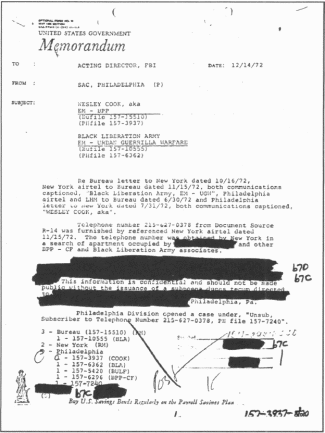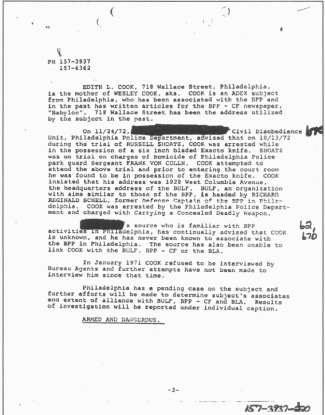CHAPTER SIX: The Empire Strikes Back: COINTELPRO
History should teach us ... that in times of high emotional excitement, minority parties and groups which advocate extremely unpopular social or governmental innovations will always be typed as criminal gangs and attempts will always be made to drive them out.
-- Hugo Black, Associate Justice, US Supreme Court [1]
IF THE BLACK Panther Party was a Black rebel band (and it was), the State would, as has historically been the case, respond with repression (and it did). From the highest levels of government came threats of destruction and wild, exaggerated claims of the violence posed by the Black Panther Party. The incoming US Attorney General, John Mitchell, a law partner of the persnickety Richard M. Nixon, vowed to "wipe out the Black Panther Party by the end of 1969." [2] Mitchell was the head of the government department encompassing the FBI, and his threat was not empty. The longtime head of the nation's premier law enforcement agency, J. Edgar Hoover utilized the enormous powers of his agency to put meat on the bones of Mitchell's threat.
Hoover skillfully utilized not only the powerful bureaucracy that he built and controlled, but also the vast powers of the predominantly white corporate press to demonize the Black Panther Party in the eyes of most of America. This clever, cunning, and quite bigoted man used one of the most powerful weapons ever in the scabbard of a politician -- fear. The Black Panther Party, Hoover claimed, "represents the greatest threat to the internal security of the country." [3] Why did he claim this?
If Hoover was to be believed, the Black Panthers were "the most violent of all" the Black militant groups, and he lamented "that the Communist Party has not been able to control" them. What peeved the "minister of internal security" was his observation that "black militants are more or less a law unto themselves and want no leadership other than their own." One wonders why Hoover, an ardent anticommunist, would decry the lack of control by the Communist Party, or their self-leadership? Moreover, he testified, "leaders and representatives of the Black Panther Party travel extensively all over the United States preaching the gospel of hate and violence, not only to ghetto residents, but to students in colleges, universities and high schools as well." [4]
What seemed to bother the pugnacious Hoover most, then, was the political independence of the Panthers (and other "black militants") and his inability to use them to prove his long-held pet theories of communist infiltration and foreign control of Black revolutionary political movements. What angered him further was the Party's growing influence, not over "ghetto residents" but on white youth in the nation's educational institutions.
Which was the real "greatest threat"?
For, if the FBI chief was correct that the Black Panthers were teaching a "gospel of hate," isn't it unlikely that such a doctrine would find support on college campuses, which in the late 1960s were certainly overwhelmingly white institutions? There is then, clearly, something else that motivated the State in its scorched-earth campaign against an entity it deemed the greatest threat to internal security.
The problem wasn't that the Black Panther Party was a "hate-based group," but that it was not.
It wasn't that the organization had an ideological affinity to Marxism-Leninism-Maoism. It wasn't that the Party was (in FBI-speak) "violence-prone."
These were mere pretexts.
Much to the chagrin of their nationalist contemporaries, the Black Panthers viewed themselves as internationalists and worked with people from a wide range of racial and ethnic groupings. Through the offices of its National Fronts Against Fascism, the Party had information and propaganda centers functioning in white communities. People who were reticent or afraid about going into the Black community could visit to read or purchase firsthand accounts of the revolution being waged in other parts of the Empire.
If you "hate" someone, you don't work with him.
One case study should give us some telling insight into whether it was the Black Panther Party or the groups that targeted them, the FBI and other government agencies, that operated as hate groups. Let us examine the remarkable career of Chairman Fred Hampton, the brilliant Chicago Panther and organizer of the Illinois chapter who, while barely twenty, had built one of the most impressive branches of the BPP in the nation.
As youth leaders in the Chicago NAACP, Hampton and his boyhood friend, Bobby Rush, felt that the integrationist, assimilationist-type group did not address sharply enough the challenges faced by the Black community. They were drawn to the open militance of the Black Panther Party, and that attraction would set the stage for a drama and political tragedy of epic proportions.
By all accounts, Hampton was a revolutionary who submitted his whole being to the ideology of the organization and the revolution. A gifted, engaging, and passionate speaker, Hampton's country-cadenced speech touched listeners with his own enthusiasm and youthful brio. He would organize, if given the opportunity, everybody, everywhere within earshot. He worked with the Young Lords, a street gang in Chicago, and inspired the young Puerto Ricans to organize into a collective, political organization. The Young Lords Party was born. He did similar work among other ethnic groups.
Elaine Brown, with all her sophistication and worldly wisdom, found herself moved to tears when she and Chief of Staff David Hilliard saw this young Panther leader in action:
Hundreds of Panthers were lined up in a West Side Chicago schoolyard, ready to start the day's work. "Chairman Fred" was making sure his chief of staff would see the good work the Illinois chapter was doing. Chicago Panthers, Fred explained, lined up that way every morning. It was a demonstration of discipline and commitment. Fred felt it was an inspirational way to get the day started. It was.
"I ain't gon' die slippin' on no ice!" Fred shouted into a bullhorn, walking up and down the aisles of Panthers like a Baptist preacher.
"I ain't gon' die slippin' on no ice!" Panthers shouted back.
"I ain't gon' die in no airplane crash!"
"I ain't gon' die in no airplane crash!" they responded in unison.
"I'm gon' die for the People!" the chairman continued, his fist high, the steam of his breath bursting into the bitter early morning cold.
"I'm gon' die for the People!" came the echo.
" 'Cause I live for the People!"
" ... live for the People!"
" 'Cause I'm high on the People!"
" ... high on the People!"
" 'Cause I love the People!"
" ... love the People!"
"Power to the People! Power to the People! Power to the People!" [5]
The legendary Chicago wind -- the chilling, mighty Hawk -- was cutting through the West Side at seven a.m., freezing Brown's cheeks, she recalls. But her cheeks were warmed by her tears as the surge of revolutionary love went through her like a wave.
But the FBI was also watching and listening. The organizing abilities of Hampton would fill them with alarm. Hampton worked with Puerto Ricans, Mexicans, Asians, even poor white greasers -- anybody, everybody -- to build revolution. He worked with Black apolitical gangs, such as the notorious Blackstone Rangers, and had almost effected an alliance, until their leader, Jeff Fort, had misgivings. Perhaps Fort felt Hampton was a challenge to his power; perhaps he intuited that a political affiliation would pose serious dangers to his organization. Perhaps it was the influence of letters like this one, sent, unbeknownst to him, from the FBI and authorized by J. Edgar Hoover on January 30, 1969:
I'm not a Panther, or a Ranger, just black. From what I see these Panthers are out for themselves, not black people. I think you ought to know what they're up to, I know what I'd do if I was you. You might here [sic] from me again. [6]
At the same time that Fort was getting fake, FBI-generated brownmail, Panthers were getting mail from the same anonymous source, suggesting that Fort was planning to "off" Hampton.
To their credit, neither Fort nor Hampton reacted badly in response to these perceived provocations. Indeed, Hampton's courageous response was to go to Ranger headquarters to discuss this matter with Fort, and even though they discovered that neither had written the other, the damage was done. For, although this specific FBI brownmail attempt did not end in violence, it frustrated Hampton's objective of politicizing the Rangers and thereby bringing them, en masse, under Party discipline. Had he succeeded, over three thousand young men would have joined the Black Panther Party, and gangsters would have begun the transition to revolutionaries.
Both Hampton and Fort were the unwitting targets of the nefarious FBI COINTELPRO (COunter INTELligence PROgram) operation, ordered and authorized by Hoover.
While neither Hampton nor Fort were aware of the government activity tainting the wellsprings of their relationship, this was, in fact, one of hundreds of such operations occurring across America, designed with an overt political, and indeed racial, objective: to prevent Black unity and to prevent Black self-determination. In essence, the FBI functioned as political and race police -- agents for the preservation of white supremacy.
What were the FBI's written, declared objectives?
... to prevent the coalition of black nationalist groups ... prevent the rise of a "messiah" who could unify and electrify the militant black nationalist movement ... prevent violence on the part of black nationalist groups ... prevent black nationalist groups and leaders from gaining respectability ... prevent the long-range growth of militant black nationalist organizations especially among the youth. [7]
Under declassified government documents obtained through the Freedom of Information Act in the mid 1970s, it was learned that the FBI began its intrusive spying, interference, and destabilization of Black groups before the founding of the Black Panther Party, and even the period of ascendancy of the Black Liberation movement. Although it used the lie of investigating hate groups to justify its efforts, the FBI also snooped on those Black leaders who were sworn to nonviolence, like the Rev. Martin Luther Kings (Junior and Senior!). According to the FBI's own records, they taped Dr. King's personal calls, sent him fake letters, threatened his life, tried to blackmail him, and even wrote him suggesting he commit suicide.
COINTELPRO, between 1956 and 1971, engaged in 295 actions against Black groups, most of them against the Black Panther Party. [8] The FBI engaged in covert criminal activities, according to FBI veteran Wesley Swearingen, who participated in illegal break-ins of properties owned by the members of the Nation of Islam. On the basis of Hoover's pretextual claim that the NOI "disavow[ed]" allegiance to the US, the Attorney General approved wire-tap surveillance. In December 1956 this was taken by Hoover as a green light to run bag jobs, that is, illegal break-ins. Swearingen tells us:
[T]he only plausible reason for the FBI to break into the homes of members of the Nation of Islam was Hoover's hatred for African Americans and Hoover's desire to keep Elijah Muhammad from becoming a messiah for African Americans.
We bagged the residence of two Nation of Islam members and photographed membership lists and financial records, even though the Nation of Islam was not a threat to the U.S. government. I acted as the lookout for the bag jobs on members of the Nation of Islam while fellow agents broke into their homes. [9]
Let us not engage in the delusion that this action was undertaken by government agents who were performing a valuable national service for the greater good. Swearingen leaves no room to doubt whether he or his colleagues were knowingly ordered to violate the law against fellow American citizens:
We had no authority for the bag jobs we did, and so we in the FBI were the ones who violated the Constitution. When we started bag jobs on a black religious organization, I knew then that the FBI was out of control, but I could not stop it because no one would have believed me -- not even Hoover's most severe critics. If I had said anything, Hoover would have had me prosecuted for violating local burglary laws. [10]
The nation's premier law enforcement agency, one said to be investigating hate crimes, had itself been committing crimes motivated by hatred against Black Americans for decades. These crimes would pale beside other actions that the State would take against such alleged "citizens" in the years to come.
War Against the People
In 1919, the first director of the Bureau of Investigation (the forerunner of the FBI), J.W Flynn, aptly described his agency's objectives when he noted, "[the Bureau] required a vigorous and comprehensive investigation of anarchists and Bolshevists, along with kindred agitators -- advocating change in the present form of government." [11] In the government's own terms, those who advocated change in government were perceived as enemies, and actions were taken against them as if they were such. Through intimidation and the fear of incurring the subtle wrath of the unsleeping State, the history of governmental crime against its own citizens has been allowed to be buried in the dust and detritus of time.
When such crimes perpetrated by the government do reach the light, they are quickly plunged into darkness. They are hidden in thick government tomes of roughly a thousand pages that the average American, much less the naive youth under the tutelage of a harried, overworked, and underpaid history teacher, will never read and perhaps will never know exist. These sources provide telling and damning evidence of the depths of the government's secret wars against its own civilians. They also testify to the abject impotence of the political branches, notably the US Congress, to take meaningful action to stem the crimson tide of criminal practices conducted by the government itself! In this light, one sees the real structure beneath the apparent one: a police substructure that acts as a social and, indeed, political power unto itself, without even a hint of control by the political branches, despite public protestations and claims to the contrary.
Bold though they may be, these facts can be supported by a simple reading of documents produced by the US government, made public in hearings before Senate subcommittees, or made public by citizens' groups who acted on their own to "blow the whistle" on this intolerable state of affairs. [12]
Let us examine the evidence.
The year was 1922, and a freshman senator, Burton K. Wheeler, was on his way to Washington from Montana, partly due to the campaign efforts of the Non-Partisan League, a left-leaning coalition of Montanans who stood for good government. Senator Wheeler, truly new to the ways of Washington, criticized the corruption of the US Department of Justice (DO]) in speeches on the Senate floor. The Republican National Committee, apparently incensed at the whippersnapper's impertinence and armed with data supplied by the FBI, launched a series of attacks on Wheeler, among them the claim that while he was a US Attorney he had allowed Montana to become a "hotbed of treason and sedition." Meanwhile, G-men spied outside his home, while other FBI agents ransacked his offices on the Hill. Others tried to set him up with a pretty young trap in an Ohio hotel room. When these efforts failed, the DOJ launched a federal grand jury at him, and the freshman senator was indeed indicted for influence peddling to gain oil and gas leases for a friend.
It is worthwhile to note and here remember that this was a US senator, one of the most powerful figures in the pantheon of State power. Wheeler was eventually acquitted, and subsequent Senate hearings turned up the sources of the anti-Wheeler plot. The Bureau's director at the time, William J. Burns, testified that the Bureau was used in a vendetta against Wheeler because he criticized the Justice Department. Another witness told the committee that FBI agents openly acknowledged they wanted to "frame" the senator. [13] Members of Congress held hearings, several prominent people in the Bureau resigned, and all seemed right with the world. Yet the real question remained: what would have happened if the accused was not a member of the US Senate, but an average Joe? What if the FBI had been adroit enough to engineer a conviction in the senator's case? Indeed, what made the FBI and DOJ think they could do this, with virtual impunity, but their prior practice?
The powerful have resources that the powerless do not. The powerless suffer silently and often alone, and their hearings result in stone-faced denials or meaningless platitudes that preserve the prerogatives of power.
Preschool teacher Evelyn R. Sell was described by those who knew her as an intelligent, excellent teacher who was well qualified for her job. She also happened to be a socialist. She joined the Socialist Workers Party (SWP) in the late 1940s and had even run for various political posts under the banner of her group. This was a perfectly legal activity and a public one.
When she moved from Detroit, Michigan, and sought work in Austin, Texas, little did she know that the FBI and the Austin Police Department had engaged in an interstate, interagency conspiracy against her to ensure that she would not be hired for a job that even the FBI admitted she was "well qualified" for.
As documented in her FBI file of March 31, 1970, under the subtitle, "Evelyn Rose Sell, SM-SWP," which incidentally means, Subversive Matter-Socialist Workers Party, the Bureau comes to the following conclusion:
The decision not to issue a new contract or consider the subject further for employment after the termination of her current contract is based upon information received from [deleted] the Austin Police Department. [14]
Austin's School Board president at the time, a Mr. M.K. Hage, Jr., said that knowledge that someone was a socialist was sufficient grounds to fire them. [15]
When Mrs. Sell had the good luck to be hired elsewhere in the same field, the FBI strenuously sought to have her dismissed, visiting her supervisors at least three times, according to her file entries. Sell would later explain that her employers resented the heavy-handed tactics of the Bureau. "The HOC (Human Opportunities Corporation, a Head Start-like agency) directors were outraged by the visits." Sell added, "One of them told me that he was seriously considering filing a lawsuit against the FBI because of the harassing visits." [16]
In her personal files sat a letter from the parents' council of the program, which read, in part:
We wish to commend Mrs. Evelyn Sell ... for a job well done! The fairness and efficiency in her willingness to always make herself readily available if she could be of any help in any situation was quickly recognized. [17]
Mrs. Sell was seen as so much of an asset to the HOC that it was in their interest to ignore the whisperings of the FBI.
There were others, however, who were not as lucky as 1,Irs. Sell.
Morris Starsky was a professor of philosophy at Arizona State University. When a faculty committee at ASU met to consider whether to renew his teaching contract, the committee was influenced in its deliberations by the unseen presence of the FBI which sent an anonymous letter rife with slander against the educator.
An FBI memo of the period finds it "pretty obvious" who the target of their COINTELPRO ire in the area should be: "It is apparent that New Left organizations and activities in the Phoenix metropolitan area has received their inspiration and leadership almost exclusively from the members of the faculty in the Department of Philosophy at Arizona State University (ASU), chiefly assistant Professor MORRIS J. STARSKY." [18]
Without a doubt, Starsky was an outgoing, and active, activist. He helped organize ASU's first antiwar teach-in; he helped lead campus recognition for SDS (Students for a Democratic Society); he joined campus efforts to support the formation of a union for Chican@ laundry workers; and served as the faculty adviser for the Young Socialist Alliance and the Student Mobilization Committee (MOBE).
Members of ASU's administrative committees received slanderous letters signed by ''A Concerned Alumnus" that were actually sent from agents of the FBI and personally approved by J. Edgar Hoover. Notwithstanding this heavy-handed and duplicitous activity, the committee recommended unanimously that Starsky not be dismissed, but the state's Board of Regents had other ideas and refused to renew his contract.
In July 1970, Professor Starsky was out of a job. He subsequently lost two teaching posts in California for political reasons. Starsky would later describe his experience as "sort of like being found innocent and executed anyway." [19]
He asks, "What teacher is safe? What ideas would not subject a teacher to this kind of attack? Only U.S. government-approved ideas." [20]
In such a climate, in such a world, how can it be said that there was even the merest shadow of academic freedom -- or freedom period?
Cliff DeBerry was a Black laborer who was attracted to the socialist movement because he felt their ideas made sense. He was an average guy with high hopes for the future. What he didn't reckon on was the FBI.
When he joined the Socialist Workers Party and began speaking on their behalf in Harlem and in other communities, the agents of COINTELPRO took note and began to devise ways to scuttle his efforts, destabilize the growing coalition between Blacks and members of the SWP, and discredit the man.
When DeBerry became active in the labor movement and entered electoral politics in the SWP's name, the Bureau launched a self-described disruption program in October of 1963. Once again, an anonymous letter was prepared; this one revealed DeBerry had a prison record. The objective of the FBI is clearly reflected in a memorandum from the Director, to New York's Special Agent in Charge (SAC):
On 10/14/63, the anonymous letter authorized in relet was prepared on a manual typewriter utilizing commercially purchased stationery. The letter was mailed 10/14/63 from a suburb of NYC.
The Bureau will be advised if any tangible results are noted from this disruptive tactic.
The NY Local of the SWP is presently running a candidate for the position of Councilman-at-large in the borough of Brooklyn. A review is being conducted of CLIFTON DE BERRY's file to determine if there is anything derogatory in his background which might cause embarrassment to the SWP if publicly used. It is noted that on a previous occasion it was possible to have printed in a daily NY newspaper the prison record of an SWP election candidate.
If a review of DE BERRY's file reflects a disruptive move is possible, the Bureau will be advised. [21]
The anonymous letters were routed to news media in New York in an attempt to scuttle the DeBerry /SWP campaign. DeBerry lost the election.
Nor was the FBI interested only in disrupting the political career of the candidate, but also his economic life. As he told fellow SWP members, "I would get a job, and it would only last three days. I would go from one job to another, and it would be the same story. The FBI would visit my boss, and I would be fired." [22]
Only when he found a stubborn employer, who refused to be cowed by the FBI, did DeBerry manage to hang on to a job. He learned the craft of painting, which became his lifelong trade. Still the Bureau snoops would turn up every three or four days to "check up" on him. He worked with Malcolm X during his Harlem years, as the radicalized minister tried to develop his political and religious organizations (the Muslim Mosque, Ine. and the Organization of Afro-American Unity). The FBI tried a number of tactics to divide DeBerry's group from the followers of Malcolm X.
A final example which examines a COINTELPRO attack on a Black nationalist group apart from the Panthers, reveals the breadth and depth of the State's reach. Having learned that the head of the Black Liberators, a Black nationalist group in St. Louis, was physically separated from his wife, the FBI prepared a macabre Valentine's Day present. The FBI memo of February 14, 1969, sets forth the following insidious COINTELPRO action:
Enclosed for the Bureau are two copies and for Springfield one copy of a letter to "SISTER [rest of name deleted].
The following counter-intelligence activity is being proposed by the St. Louis Division to be directed against [Name Deleted]. He is former [deleted] of the BLACK LIBERATORS (Bufile 157-10356), [rest of sentence, roughly page in length, one line deleted]. The activity attempts to alienate him from his wife and cause suspicion among the BLACK LIBERATORS that they have a dangerous troublemaker in their midst.
BACKGROUND:
[Name of target deleted] is currently separated from his wife, [name deleted] who lives with their two daughters in [deleted]. He occasionally sends her money and she appears to be a faithful, loving wife, who is apparently convinced that her husband is performing a vital service to the Black world and, therefore, she must endure this separation without bothering him. She is, to all indications, an intelligent, respectable young mother, who is a member of the AME Methodist Church in [the rest of the page, except for routing notations at the bottom, is deleted and blanked out]. [23]
The rest of the memo is as remarkable, and as unseemly, as the foregoing. It dictates the text of a letter, to be inscribed with sloppy handwriting, intentional misspellings, and grammatical errors to "imitate that of the average Black Liberator member," and to be mailed to the leader's wife. It is intended to evoke jealousy in his wife by stating that the leader was cheating on her with other women. This COINTELPRO goes further as the St. Lows office recommends that the fake letter be photocopied and sent to the Liberator's office, to ensure that the leader knows it was written and that he suspects he was betrayed by one of his subordinates.
There is no reason to wonder as to what the objectives of the operation were. The proposal from the SAC in St. Lows to Hoover in Washington leaves little to speculation.
The following results are anticipated following the execution of the above-counter-intelligence activity:
1. Ill feeling and possibly a lasting distrust will be brought between [blank] and his wife. The concern over what to do about it may detract from his time spent in the plots and plans of [deleted]. He may even decide to spend more time with his wife and children and less time in Black nationalist activity.
2. The Black Liberators will waste a great deal of time trying to discover the writer of the letter. It is possible that their not-too- subtle investigation will lose present members, and alienate potential ones.
3. Inasmuch as Black Liberator strength is ebbing at its lowest level, this action may well be the "death blow." [24]
The shortest month in the year would not pass before a letter was routed from the doddering Director of the FBI to the Special Agent in Charge of St. Louis, giving his baronial blessing to the enterprise. Hoover's approval for the operation warns the local office to be careful and use "precautions" to ensure that "this cannot be traced back to the Bureau." [25]
His only other substantive recommendation was that the local FBI office wait ten days between letters (apparently to make it appear that the letters were indeed mailed through the postal system by the people they appeared to come from).
There is little indication in these flies, published as exhibits of the legendary Church Comrnittee [26] hearings by the US Congress, whether the FBI succeeded in its ''Anticipated Results" or whether they exceeded their expectations. What is clear is that the State, utilizing crude, incredibly slimy methods, came between man and wife, father and child, to cause marital and familial discord, because a man believed in Black nationalism.
In present day America, the charge that one is an enemy combatant results in the shackled, blindfolded, tortured, and denationalized captives of the US military base and mass outdoor brig at Guantanamo, Cuba. Yet decades before the USA PATRIOT Act, the assistant director of the FBI made plain his feelings about the tactics to be used, in a contemporary sounding phrase, against American citizens who "sought change in the present U.S. government."
William Sullivan, the number two man at the FBI and COINTELPRO chief, responded to the charge that the Bureau was "using techniques designed to destroy a person's family life." [27]
[T]his is a common practice, rough, dirty, tough, dirty business .... We are in it. To repeat, it is a rough, tough, dirty business and dangerous. We have used that technique against foreign espionage agents, and they have used it against us." [28]
A US senator questioning Sullivan seems incredulous at what the FBI Assistant Director is telling him:
Q: The same methods were brought home?
A: Yes; brought home against any organization against which we were targeting. We did not differentiate. This is a rough, tough business.
Q: Would it be safe to say that the techniques we learned in fighting Bundists and Silver Shiners, true espionage in World War II, came to be used, the techniques came to be used against some of our own American citizens?
A: That would be the correct deduction. [29]
If the tactics used against foreign nationals and enemies of the United States were utilized against American citizens, what does that say about the meaning of American citizenship? What does it say about the meaning of the State? The nature of the government? The nature of the security apparatus?
Senator Walter Mondale, a vocal and active member of the Church Committee, speaking for the record on the tactics used against the late Rev. Dr. Martin Luther King, Jr., seems particularly disturbed by the actions of the FBI. This series of questions and responses between Mondale and the committee's Chief Counsel, Frederick A. O. Schwarz, Jr., goes to the very heart of why the hearings were held in the first place -- COINTELPRO's excesses and constitutional violations.
Senator MONDALE. Would it be fair to say that the tactics used against Dr. King had been borrowed from tactics used against foreign risks, spies, agents, and the rest, who could and did pose a threat?
Mr. SCHWARZ. Mr. Mondale, your own examination of Mr. Sullivan seems to have brought home that point as clear as it could be ....
Senator MONDALE. I raised the Dr. King example because I think that is the classic example which shows all of the elements and the dangers involved in this tactic.
When did counterintelligence programs stop?
Mr. SCHWARZ. Well, that is in question.
In 1971, after they had been exposed through the media, there was an instruction that they would stop. The instruction says, however, "If anything like this is really important, please advise headquarters." And as I think some of the witnesses indicated, the line between counterintelligence and intensive investigation is one that really can not be drawn and has not been drawn.
Senator MONDALE. So are you saying we cannot be sure that COINTELPRO, in all of is [sic] elements has terminated?
Mr. SCHWARZ. I would not want to use that label, Senator, and I think that is a matter directed to the FBI witnesses. But it is a problem when you have a Director of the FBI who declines to say that the activities were improper, as he did when he testified in 1973. [30]
In 1943, during the later years of President Franklin D. Roosevelt's term, Attorney General Francis Biddle wrote a memorandum commanding his young subordinate, J. Edgar Hoover, to cease compiling security classifications of American citizens, asserting that the agency had no legal basis to prepare such lists. Biddle also called the records unreliable.
In clear, unambiguous terms, the Attorney General directed the Bureau's director to cease and desist from such record-keeping. Words like "compiling" and "records" serve to obscure the true nature of the activity whose initial use was the basis for determining whether to place people in secret internment camps during WWII.
Biddle, examining the program, found there was no statutory basis for it. Biddle's edict removes any serious question of the clarity of his cease and desist order:
I am satisfied that they serve no useful purpose .... There is no statutory authorization or other present authorization for keeping a "custodial detention" list of citizens. The Department fulfills its proper functions by investigating the activities of persons who may have violated the law. It is not aimed in this work as to classifying persons as to dangerousness. [31]
What was Hoover's response? He directed his underlings to simply change the labels on the "Custodial Detention" files to "Security Matter" files. He issued a directive to his agents that the fact that the agency kept such files was "strictly confidential" and not to be disclosed to those outside of the Bureau.
Even his "superiors" in the Attorney General's office were not to be informed. Hoover directed his subordinates to only share security index data with authorized agents of military intelligence groups, who were known for their ability to keep secrets (even from other sectors of the executive branch).
This account just skims the surface of the history of a long-running, repressive regime established in the shadows of the US government. The government, armed with all the awesome powers at its command, destroyed the lives and livelihoods of thousands, nay, tens of thousands of people, who simply opposed the status quo and wished to change the way things were done in this country. We have only the haziest insight into the true scope of this program, for, as has been suggested, Senate hearings into the problem did not meaningfully resolve the problems. Indeed, at the time of the hearings, some five years after the startling revelations of COINTELPRO became public, senators and Senate staffers could not say with any degree of confidence that it had ended. It is easy therefore, to view the hearings themselves with a certain degree of cynicism. While they provided a riveting show, a thrilling political performance, a scripted pantomime of the workings of democracy, they remained, after all was said and done, mere performance. When the curtain came down on the show, the real world, with its painful ambiguities and chilling truths about power, race, and violent white supremacy, remained unchanged. Revelation is not transformation -- it only looks like it.
After the revelations, the exposures, the hearings, what happened to those people who committed crimes against their fellow American citizens?
The department of the US government that calls itself Justice decided, some four years after the scandal broke, that no one would be held liable "in connection with the Federal Bureau of Investigation's fifteen-year campaign to disrupt the activities of suspected subversive organizations." [32] J. Stanley Pottinger, head of the Civil Rights Division of the DOJ, reported to the Attorney General that his office had found "no basis for criminal charges against any particular individuals involving particular incidents." [33] The government that murdered people, that hired others to murder people, that drove people into poorhouses, that split marriages asunder, that destroyed scores of livelihoods, had violated no "civil rights." The hearings were "punishment enough," the elite sniffed.
The efforts of the FBI against teachers, professors, workers, socialists, Black nationalists, and others (such as antiwar/peace activists) reveal the deep political nature of the agency, the Justice Department, and the United States government as a whole. Their objective was to criminalize dissent, and to instill the numbing fear of poverty into activists by running people out of their jobs solely on the basis of their political ideas. They were agents, neither of order, nor of law, but of capital. Anyone who merely questioned that arrangement, who thought that society could be organized on a more fair, rational basis, was seen as an enemy; in the words of the FBI itself, no holds were barred. [34]
The Bureau used its enormous power, influence, and contacts to intimidate politicians. It used the omnipresent press to hound people out of their jobs. It sabotaged allegedly free elections. It destroyed marriages. It shattered families. It fomented violence between political and social adversaries. And this is but the tip of the iceberg. If this is a law enforcement agency one shudders to think what a hate group would do.

